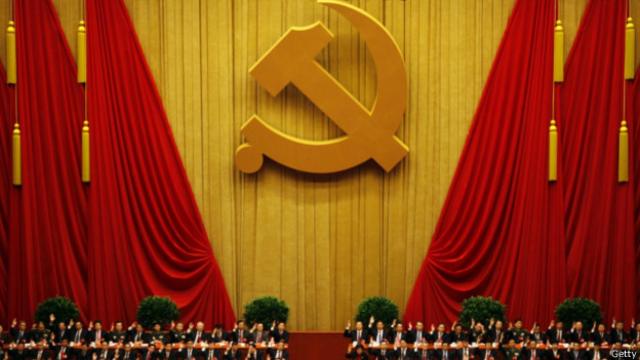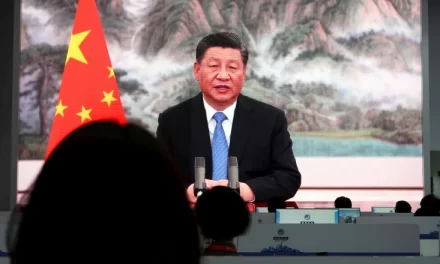By Hong Daojun
Editor’s note: The incident described below is trivial, but sometimes the smallest things are windows into the biggest truths. The incident described generated some interest for a time on Chinese social media.
Recently, a scandal involving uncivilized law-enforcement tactics by a local government broke out in Bijie City, Guizhou Province. A villager in a town in the city was holding a full-moon banquet for his child [a longtime Chinese tradition marking a baby’s survival to the age of one month, where guests are expected to bring gifts, often cash], but the town government’s law-enforcement officers attempted to stop it. Since the person involved did not listen to the attempts to dissuade him, the government official then added salt to the food in the steamer, making it inedible.

Government officials adding salt to prepared event food. Source: web photo
Without question, Chinese people have many bad habits, e.g. spitting wherever they feel like it, not using the available disposable chopsticks, causing trouble in the bridal chamber of a newly married couple, and excessive entertaining and gift giving. Some bad habits only involve one’s own self and do not affect others, such as men wearing pigtails during the Manchu Dynasty; but some bad habits have adverse effects on others or throughout society, such as the bad habit of spitting, which is not merely the perpetrator’s personal matter but pollutes the environment and spreads disease. Such bad habits historically do not exist only in Chinese society. There were also a large number of them in Western society, such as the droit du seigneur, superstitious medical treatments, etc.
Such “bad habits” are called that because they lack any scientific basis. Therefore, changing them is a very valuable thing. However, different political systems have essential differences with respect to how such customs are changed. In democratic countries, most such changes occur gradually with the development of society and the economy and the advancement of science and technology. For example, bloodletting was once commonly used to treat sickness in Western countries. It has no scientific basis, and thus can be regarded as a bad practice. The first US President, Washington, died due to the effects of extreme bloodletting. With the development of medicine, people gradually understood the pathology of infection and fevers, and abandoned bloodletting as treatment.
Democratic countries distinguish between the realms of the personal and public. Purely personal behavior that has no impact on others is regarded as one’s own business, while behavior that does impact others is regarded as the public’s business. If a person does not brush his teeth or take a shower, this is definitely a bad habit, but this is only his personal affair, and the government has no power to punish him. The only thing that can help him get rid of such bad habits is social sanction. For example, a person who does not pay attention to personal hygiene may suffer more setbacks in the process of pursuing the opposite sex. In order to avoid this, he has to pay attention to improving his personal hygiene. In a democracy, the government cannot make laws restricting freedom of conduct in such purely personal matters. If such a law were made, it would be unconstitutional. The government can only enact laws to restrict freedom of behavior that may infringe on the interests of others, such as traffic laws that stipulate that vehicles are not allowed to be driven in the wrong direction. How an individual drives is not a purely personal matter. Driving recklessly will pose a threat to the safety of others, so the government must legislate restrictions.
But unlike in democratic countries, autocratic governments do not have any legal principles constraining how they rule. Their leaders always regard their own private preferences as all that matters in governing the country. If rulers believe in communism, they will deprive the people of their freedom to invest in or run businesses. If rulers believe in certain strains of Islam, they will deprive women of their freedom to study and work. In the eyes of autocratic rulers, there is no need to distinguish between private and public affairs. Everything must be based on the ruler’s preferences. This is especially obvious on the issue of changing habits. The “Destroy the Four Olds” movement launched during the Mao Zedong era blindly burned classical literary works, destroyed cultural treasures, works of calligraphy and paintings, and destroyed places of interest in the name of getting rid of Mao Zedong’s so-called old ideas, old culture, old customs, and old habits. This movement caused great harm to Chinese society, and was a disaster.
Yes, excessive hospitality and gift-giving are bad habits, but habits that have been passed down for a long time. They involve the interests of each household and cannot be solved via a one-size-fits-all approach. For example, a villager might have given gifts many times over, and hope to recover some part of these costs by inviting guests to an event himself. At this time, if the government were to flatly prohibit him from having such a party, of course he would think it was unfair. Treating guests and giving gifts is not a public behavior that will cause direct harm to others, but a private matter in which individuals should have full freedom of choice. The government has no right to interfere at all. Society is fully capable of self-regulating excessive treating and gift giving. There is complete freedom in accepting invitations. Someone accepts invitations because he has the expectation that he will be able to recover any gift money he gives now when he treats guests in the future. If he does not have this expectation, he does not have to accept the invitation. All the government can do is to carry out extensive publicity to make everyone aware of the dangers of excessive hospitality and gift-giving, or formulate policies to establish subsidies in response to changing customs. For villagers who voluntarily give up paying for banquets, the government can provide mitigation funds to encourage them. There is no such subsidy for villagers who continue to host banquets. Through such publicity and guidance, the purpose of changing undesired customs is gradually achieved.
But in this case, in order to change a bad habit, government officials in a town in Bijie City, Guizhou Province sprinkled salt into the food at a villager’s banquet. If it happened in a democratic country, it would be an illegal case of the government depriving citizens of their private freedoms. The leaders involved would have to take the blame and resign. All other people involved would have to be be punished accordingly, and the villagers would have to be compensated for their economic losses. But unfortunately, leaders of authoritarian countries are never held accountable for their own wrongdoing. After public exposure, the salt-sprinkling incident aroused widespread social concern. However, the town government leaders and staff involved in the incident only received so-called criticism and education, and were not required to bear any liability for the villagers’ losses. Facts have repeatedly proven that simply announcing that officials will govern the country virtuously cannot restrain government officials. If we want government officials to obey the law, China must implement a democratic system.





















